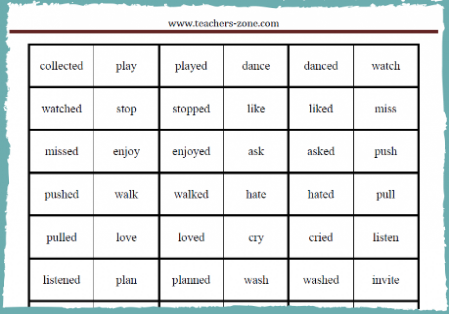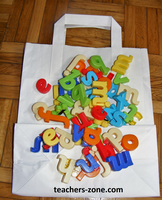VOCABULARY ACTIVITIES
ACTIVITIES
Teaching some new vocabulary to children you have to be sure that they will be able to use them properly. At first new items need to be introduced. Then it is necessary to give ESL children lots of possibilities to practise vocabulary. And finally, do not forget about consolidation of the knowledge by frequent revision. Here are presented some activities on different kind of topics to help your students to learn vocabulary in a child-friendly way.
MAKE A DONATION
Your donation will directly support us to continue making teaching resources for you.
Thank you, we are greatful for your support.
This autumn game is a perfect way to practice autumn vocabulary with young ESL learners.
Age: 4-10
Language focus:
- autumn vocabulary (in the example: acorn, apple, mushroom, pumpkin, leaves)
Materials: flashcards, a set of small pictures (about eight of each kind), a dice, a pawn
Find out how to play Autumn game
Age: 7-10
Language focus:
- any animals (in the example: dog, tortoise, mouse, lamb, guinea pig, budgie, hamster, cat, rabbit, horse)
- expression: Where's the ...?; Here it is.
Materials:
- a notebook and crayons,
- sticky notes and a pen,
- optionally: pictures of the animals and word cards.
Spin the bottle and let your students practise any food vocabulary playing Food groups word game.
Age: 8-12
Language focus:
- food groups: fish nad meat, fruit and vegetables, dairy products, grain products,
- any food items (in the example: apples, pasta, strawberries, peppers, tuna, meatballs, tomatoes, bananas, rolls, carrots, broccoli, lettuce, rice, cherries, beef, butter, spinach, buckwheat groats, cream, baguette, cheese, chicken, milk, steak, cereal, sardines, bacon, salmon, bread, cottage cheese, ham, yoghurt, sausages)
Materials:
- word cards: food items and food groups (click to download the food word cards)
- a bottle of water
Find out how to play Food groups game.
This activity can help practising house vocabulary - pronunciation as well as spelling. If it is necessary introduce or revise the vocabulary before the game.
Age: 8-12
Language focus:
- rooms and furniture vocabulary (kitchen, bathroom, basement, attic, garage, living room, study, bedroom, armchair, cooker, desk, washbasin, wardrobe, table, cupboard, fridge, sofa, bookcase)
- sentence formation
Materials: a set of cards for each group (click to download the house cards)
Memory game - basic and past forms of the verbs
Age: 10-12
Language focus: irregular past tense verbs
Materials: memory cards (one set for each group)
Click to find out memory game rules.
Memory game - basic and past forms of the verbs
Age: 10-12
Language focus: regular past tense verbs
Materials: memory cards (one set for each group)
Click to find out the memory game rules.
Domino - basic and past forms of the verbs
Age: 10-12
Language focus: irregular past tense verbs
Materials: domino sets (one for each group)
Click to find out the rules of domino game.
Domino - basic and past forms of the verbs
Age: 10-12
Language focus: regular basic and past tense verbs
Materials: domino sets (one for each group)
Click to find out the rules of domino game.

Age: 4-8
Language focus: fruit (in the example: apple, banana, orange, pear, plum, strawberries, kiwis, grapefruit, lemon)
Materials: pictures of fruit (one for each child), fruit salad recipe
Click here to find out how to do Fruit salad activity in class.
Age: 9-12
Language focus: any familiar lexical sets (in the example: animals, food, clothes, sports, jobs)
Materials: A4 paper (one for each group)
Click to find out how to do to the Categories activity in class.
The goal of this activity is to teach recognition of new vocabulary.
Age: 4-10
Language focus: any familiar words
Materials: flashcards (any vocabulary you are going to teach)
Click to find out how to do Stand up and sit down activity in class.
Age: 6-9
Language focus:
- names of the animals and their body parts, colours, animls natural habitats (for example: jungle, grasslands, river, forest, etc.)
- It is ...; It has got ...
Materials: a sheet of paper (for each student), a pencil, crayonsRead the instruction how to do Trip to the zoo activity in class.
